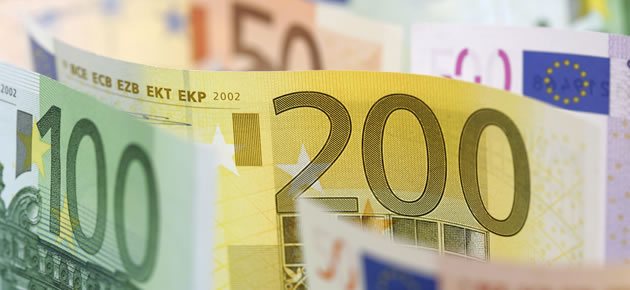Pound Sterling to Euro (GBP/EUR) Exchange Rate to Fluctuate after UK Inflation Data
The Pound Sterling to Euro (GBP/EUR) exchange rate pared an earlier decline despite investors betting that tomorrow’s UK Consumer Price Index will show that the pace of UK inflation slowed to a 25-year low in January year-on-year.
The drop off in oil prices is expected to have had a negative impact on inflation, but a figure below the 0.4% forecast would be Pound-negative.
The Pound Sterling to Euro (GBP/EUR) exchange rate was trading in the region of 1.3516 before the close of the European session.
GBP/EUR Exchange Rate Down after Eurozone Trade Stats
The Pound Sterling to Euro (GBP/EUR) exchange rate fell to a low of 1.3475 following the publication of the Eurozone’s trade balance data.
The report showed that the Eurozone’s trade surplus swelled to a record size last year, increasing to 1.94.8 billion Euros in 2014.
In December the region’s trade balance increased from 21.6 billion Euros to 23.3 billion Euros year-on-year.
Any news from members of the Eurogroup could cause additional GBP/EUR volatility in the hours ahead.
Earlier…
GBP/EUR Exchange Rate Softer as Eurogroup Meet
With the Eurogroup preparing to discuss the Greek debt situation, the Pound Sterling to Euro (GBP/EUR) exchange rate softened by 0.25% in the early hours of the European session.
Some officials have pledged that an agreement will be reached by tomorrow and if that proves to be the case, the Euro may rebound from its current 7-year lows.
The Pound Sterling to Euro (GBP/EUR) exchange rate is currently trading in the region of 1.3496
Earlier…
The Pound Sterling to Euro (GBP/EUR) exchange rate pushed back above 1.35 at the close of the week and could advance further in the days ahead.
GBP/EUR Exchange Rate News: BoE Inflation Report Supports Pound
With the Bank of England’s quarterly inflation report offering a couple of positive surprises, the Pound Sterling to Euro (GBP/EUR) exchange rate was able to return to trending above a 7-year high before the end of European trading on Friday.
In the inflation report, and Governor Mark Carney’s accompanying policy statement, the central bank indicated that industry experts may have pushed their expectations regarding the first increase in borrowing costs too far back.
It was also implied that while inflation is likely to fall into negative territory in the next few months, consumer prices could begin to recover before the end of 2015 and return to target within two years.
Further encouraging comments on the subjects of employment, growth and average earnings lent the Pound additional support.
Ongoing concerns regarding the Greek debt situation and some mixed growth reports for the Eurozone and its main economies contributed to Sterling’s dominance over the Euro.
In the coming week the GBP/EUR currency pair has the potential to climb to fresh highs.
Pound Sterling to Euro (GBP/EUR) Exchange Rate Forecast: UK Employment Data Key
The Pound Sterling to Euro (GBP/EUR) exchange rate could potentially advance beyond 1.3550 in the days ahead. Negative developments in the Greek debt negotiations could even help the Pound approach the 1.36 level – UK data permitting.
If the UK’s main economic reports print in line with, or above, forecast levels and add to the argument in favour of a BoE rate increase taking place at either the end of 2015 or beginning of 2016, the Pound will be bolstered.
Tuesday’s UK Consumer Price Index will be of particular interest.
CPI came in at 0.5% on the year in January. A further decline, or a move into negative figures, would weigh on the Pound, but an increase in inflation would be Sterling-positive.
On Wednesday the figures to watch out for are the UK’s employment change and average earnings stats.
The UK economy added 37,000 positions in the three months through December. Another sturdy jobs gain would be well received by investors, as would an increase in average weekly earnings.
January’s jobs report revealed that the level of UK unemployment was in the region of a six year low, and economist David Kern noted; ‘The modest upturn in average earnings growth is a positive development. However, wage growth will only be sustainable if it is matched by increased productivity. The focus of economic policy must remain on sustaining and improving economic growth.’
The Bank of England (BoE) will also be publishing the minutes from its latest meeting on Wednesday.
It is broadly expected that the minutes will confirm that all nine members of the Monetary Policy Committee voted in favour of leaving interest rates on hold at the last gathering. Any deviation from this would be a big surprise and a major source of Pound support.
Other UK reports to be aware of in the week ahead include the Confederation of British Industry’s Trends Total Orders and Trends Selling Prices, Public Finance figures and the nation’s retail sales report. Sales increased by 0.2% on a month-on-month basis in January. If the sales growth continued in February the Pound could end the week on a high.
At the close of the week the Pound Sterling to Euro (GBP/EUR) exchange rate was trading in the region of 1.3502
The Euro to Pound Sterling (EUR/GBP) exchange rate is currently trading in the region of 0.7404
The Pound Sterling to US Dollar (GBP/USD) exchange rate is currently trending in the region of 1.5400
The US Dollar to Pound Sterling (USD/GBP) exchange rate is trading in the region of 0.6491
On Sunday the Pound Sterling to Euro (GBP/EUR) exchange rate was trading in the region of 1.3526



